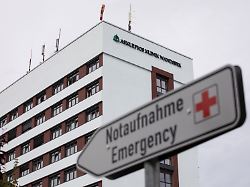Hospitals in the inflation trap
Why a hospital operator saves on the butter
By Sebastian Schneider
01/24/2023, 5:18 p.m
The inflation does not stop at the already battered hospitals: For patients with health insurance, butter is only available on request from a group of clinics in Hamburg. This step is intended to save around 330,000 euros a year. But the problem is fundamental.
Since December, health insurance patients in the seven Hamburg clinics of the Asklepios Group have no longer received butter with their meals. Like that at first “Hamburger Abendblatt” reported, since then, plant-based spreadable fat, i.e. margarine, has ended up on the bread of the health insurance patients. “The savings are unavoidable in view of the increased purchasing, logistics and personnel costs in the subsidiary responsible for the food supply,” explains Asklepios spokesman Mathias Eberenz in an interview with ntv.de. “We’re no better off than other sectors or private households.”
Overall, the Hamburg clinics had piled up costs totaling 2.6 million euros due to the increased prices for food supply. Because margarine is now served as standard, the company can save around 330,000 euros a year in Hamburg alone. Recently, the butter prices have risen exorbitantly: according to the data of the Federal office of statistics the price in December was almost 40 percent above the previous year’s level.
The patients wouldn’t have been bothered that the butter was no longer standard, says Eberenz. It plays no role in healing, vegetable fats are even richer in healthy, unsaturated fatty acids. The Asklepios spokesman explains that every patient is asked about their stay as standard. “The changeover is now almost seven weeks ago, but so far there have been no complaints from the patients.” The trend is different: “We’ve been getting more and more questions about vegetarian and vegan food for years.” And the butter hasn’t completely disappeared either – it’s still available on request. The fact that private patients are still given butter as standard has contractual reasons with the insurance companies, it is said.
Gass: “96 percent of the clinics cannot cover expenses from current income”
The Streichfett message stands for a fundamental problem. “So far, the flat rates per case that hospitals are paid have not included any inflation adjustment,” says Eberenz. Asklepios is one of the largest private clinic operators in Germany. The company maintains around 170 health facilities nationwide, and around 67,000 people work for the clinic operator. As with many companies, their costs are increasing, but unlike normal companies, hospitals cannot pass this on: They do not have customers, but patients. Therefore there are not many adjusting screws.
In addition, the situation was difficult even before high inflation. “Due to the sharp rise in prices, hospitals in Germany are under extreme pressure to save, in addition to the already tense economic situation,” says the chairman of the German Hospital Association (DKG), Gerald Gass, ntv.de. “96 percent of the clinics can no longer cover their expenses from current income,” he said. “Under these conditions, hospitals have to look for potential savings without reducing medical quality.” The DKG does not comment on individual measures taken by a hospital, says Gass.
DKG has been warning of an imminent wave of bankruptcies since last December. In the industry survey Hospital Barometer 2022 only six percent of German clinic operators stated that their economic situation was good. More than half (56 percent) assume that their economic situation will continue to deteriorate in 2023. According to DKG figures, the structural deficit will add up to around 15 billion euros this year. The federal and state governments are currently working on a fundamental hospital reform.
